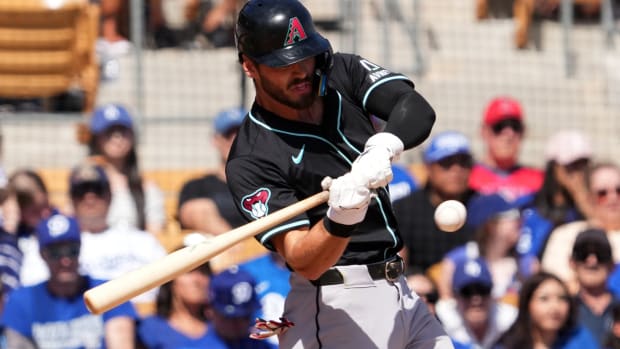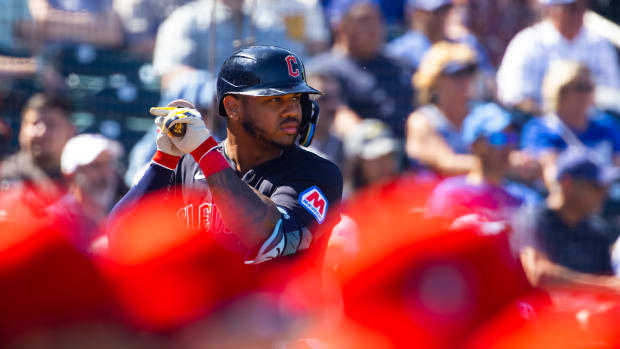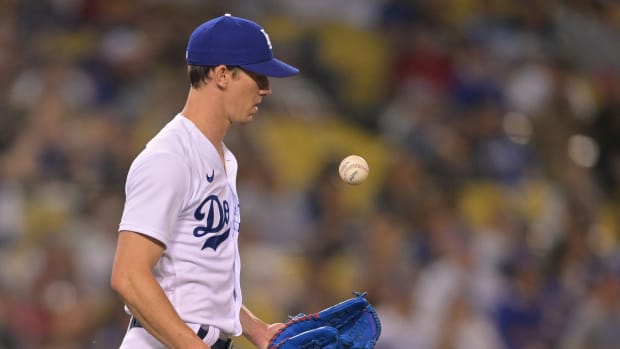Out of control: Rangers release Daniel Bard after failed comeback
A few short years ago, Daniel Bard ranked among the game's top relievers, a dominant setup man who appeared well on his way towards a big payday as a closer. Then he lost his ability to throw strikes — if not as suddenly as Rick Ankiel, then as definitively. On Thursday, the Rangers released the 28-year-old righty — who last appeared in a major league game on April 27, 2013 — making them the third team to give up on fixing his career in the past nine and a half months.
Indeed, it's not hard to see why Texas bailed on Bard simply by eyeballing his numbers. Pitching for Single-A Hickory of the South Atlantic League, he had retired just two of the 18 hitters he had faced this year while walking nine and hitting seven others. He didn't allow a single hit, and with one strikeout, that means only one batter put a ball in play against him. With 13 runs charged to his name, his ERA stood at 175.50, his WHIP at 13.50, his walks per nine at 121.5.
Bard's current plight includes a caveat, in that he underwent surgery to correct Thoracic Outlet Syndrome, a compression of the nerves and/or blood vessels somewhere in between the neck and the armpit back on Jan. 2. Even so, his control problems — and the fact that he failed to retire a single hitter in three of four outings — make it nearly impossible to place him in a competitive situation, a problem that has surfaced before.
Before the Red Sox tabbed him in the first round of the 2006 draft out of the University of North Carolina, Bard had shown the occasional tendency to struggle with his control. Those problems manifested themselves far more seriously in his first professional season. At two levels of A-ball in 2007, he walked 78 hitters while striking out 47 in 75 innings. He overhauled his delivery that winter while working as a reliever in the Hawaii Winter League, ditching his windup to work out of the stretch, which enabled his career to take flight. Armed with a fastball that could reach triple digits, a low-90s power sinker and a decent slider, he put up a 1.51 ERA with 12.4 strikeouts per nine against just 3.5 walks in 2008, climbing to Double-A Portland by the end of the season.
Promoted to Triple-A Pawtucket to start the 2009 season, Bard whiffed 29 batters in 16 innings before getting called to the majors in mid-May. He continued to miss bats for the Red Sox. In 49 1/3 innings, he struck out 11.5 per nine while walking 4.0 en route to a 3.65 ERA; by season's end, he was a high-leverage setup man in front of Jonathan Papelbon. He dominated in 2010 (1.93 ERA, 9.2 K/9, .218 BABIP) and carried similar numbers into September 2011 (2.03 ERA, 9.1 K/9, .205 BABIP), but like the rest of the team, his performance unraveled over that final month. In 11 innings, he walked nine and was charged with 13 earned runs, taking the loss four times.
That winter, despite the departure of Paplebon via free agency, Bard and the Red Sox decided that the pitcher would come to spring training as a starter, but between reintroducing the windup, expanding his repertoire to include a changeup, and losing over four miles per hour of velocity on his fastball, he was shaky. He put up a 5.30 ERA across 10 starts, walking 36 while striking out 34 in just 54 innings before the Sox pulled the plug in early June.
Back in Pawtucket to work in relief, his control veered into the land of Ankiel, Mark Wohlers and, most famously, Steve Blass. But even though he walked 29 in 32 innings and put up a 7.03 ERA, the Sox — themselves amid a 93-loss debacle — brought him back to the majors for some reason. Working out of the bullpen, he was tagged for nine runs and walked six in 4 1/3 innings from August 31 onward, his career officially in the weeds.
Bard began the 2013 season at Double-A, and he appeared to at least have stabilized; in eight appearances, he threw nine innings with four walks and four strikeouts before getting called up for a brief tour of duty with Boston. He pitched a scoreless, walkless inning in his first appearance, but walked the only two hitters he faced in his second, and then was sent back down.
Then came the real implosion, the nearly fatal bout of Steve Blass Disease. He retired just 11 of 26 batters he faced while walking 13, hit the disabled list due to an abdominal strain, and didn't return for more than three months; when he did, he walked 10 of the 17 hitters he faced, spread out over three appearances.
Out of ideas and/or patience, the Red Sox put Bard on waivers on September 1. Not surprisingly, he was claimed by the Cubs; it was on the watch of club president Theo Epstein that he had originally been drafted. Bard never pitched a competitive inning for them, however. He was non-tendered in December and again proved unpitchable during a brief stint in the Puerto Rican Winter League.
Back in September, former teammate Josh Beckett, who himself underwent Thoracic Outlet Surgery last July, was the one who suggested to Bard that he might be suffering from the same condition, and indeed, tests confirmed that was the case. In mid-February, after undergoing the surgery, which required the removal of part of a rib, and then signing a minor-league deal with the Rangers, he told Boston radio station WEEI that his symptoms were already manifest during his experiment as a starter:
“I think through the whole starting thing it happened to coincide with when, and I think the increased workload of starting in 2012 probably sped up the process and made this situation a little worse,” Bard said. “And not to mention you’€™re not feeling a lot of outward symptoms, you’re not feeling pain. So you don’€™t think anything’s wrong with you physically and then when the results of what you expect them to be, velocity is down, command is a little bit worse. You immediately try to start fixing things and the first thing you try to fix in baseball is usually mechanics. If it’s not mechanics, it’s something mental. … It was just kind of a snowball effect of me trying to fix things when in reality I was kind of working with a not fully functional nerve in my arm which I think affected me more than anyone realized at the time.”
At this writing, none of the many reports of Bard's release by the Rangers have suggested that he's still experiencing symptoms of TOS or any other physical woes. One still has to wonder whether he came back too quickly, though without knowing the degree of severity of his previous problem, it's impossible to gauge. To call up two examples, Beckett didn't return to the mound until this past spring but has since recovered some degree of his peak form, while Chris Carpenter underwent the surgery in July 2012, was back in the majors in two and a half months, but made just three appearances in September and October before spending all of 2013 battling further symptoms and ultimately retiring.
Perhaps there's another chapter yet to be written for Bard, but he will apparently have to find a team with more patience to sort him out than the Rangers.



































